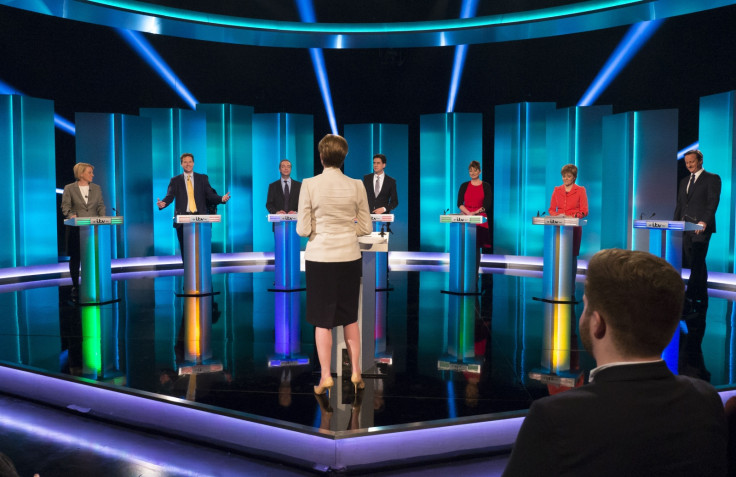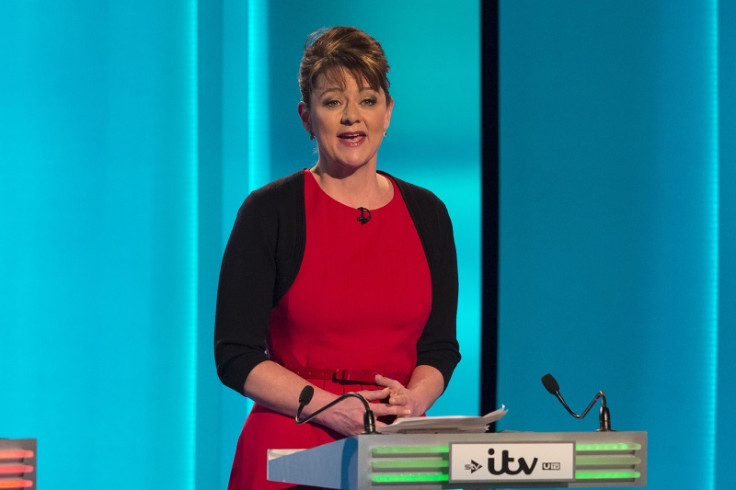IBTimes UK picks out the high and low points of the election debate

The leaders of the UK's main seven political parties clashed in a historic televised election debate. After an emotionally-charged and acrimonious two-hour argument in which the party leaders fired heated exchanges at one another, pollsters were just as divided as the UK's population as to who came out on top.
IBTimes UK analyses the highs and lows of the battle for British hearts and minds.
1. Immigration

UKIP's rise, immigration and the UK's membership of the European Union have dominated the discourse of British politics, but this proved to be a low point in the debate.
Farage attacked immigrants and resorted to negative tactics, painting immigrants as leeches on British society. He also accused all other party leaders of being dishonest with voters without recognising the benefits of the union.
"I told you at the start that they were all the same and there you are. We have a total open door," he said. "We have to build a new house every seven minutes just to cope with the level of immigration."
Immigration is notoriously difficult to measure given its highly circumstantial nature, but Farage is intent on tarring all immigrants with the same brush, refusing to acknowledge their economic contributions.
As inconceivable as this may sound, here's a potential theory: maybe, just maybe, many immigrants are working in Britain, just as our 'expats' do abroad?
Clegg and Sturgeon offered fierce retorts, defending immigration.
2. Disunited Kingdom
100 business leaders back Tories. Tories give big business £5bn.
While...
913,000 visit a foodbank.
@unionstogether pic.twitter.com/s9Xw8SVpoI
— James Melville (@JamesMelville) April 1, 2015Five years ago, David Cameron issued a rallying call to the public, saying: "We're all in this together". But the number of food banks has increased exponentially, wages have shrunk and yet the personal fortunes of Britain's top 1,000 people have doubled since the 2008 crash.
Clegg seized the opportunity to attack his coalition partner. Why are the Conservatives "not going to ask the richest in society to make a single extra penny of contribution to balancing the books through the tax system?" he asked, glossing over the thousands of people struggling to put food on the table.
Meanwhile, Sturgeon and Plaid Cymru leader Leanne Wood asked whether any of the four nations would be forced to exit the EU against their will, in the event of an in-out referendum being called, highlighting the tribal interests of each party without addressing the very real and prevailing issues facing the country.
3. Farage gets found out

The highlight of the night undoubtedly and unexpectedly came from Leanne Wood, who sternly rebuked Farage for his comments about people who are diagnosed as being HIV-positive.
"Sixty per cent of them are not British nationals," claimed Farage. "They can come into Britain from anywhere in the world and get diagnosed with HIV and get the retro-viral drugs that cost up to £25,000 per year per patient."
But Farage was sharply shut down by, Wood who – to loud approving applause from the audience – triumphantly declared: "This kind of scaremongering is dangerous: it divides communities and it creates stigma to people who are ill and I think you should be ashamed of yourself."
What the pollsters said
YouGov ranked Scottish National Party (SNP) leader Nicola Sturgeon as the debate's victor with 28%, while an ICM poll for The Guardian said Labour helmsman Ed Miliband occupied top spot with 25% of support. A ComRes post-debate poll for ITV tied David Cameron, Ed Miliband and UK Independence Party (UKIP) leader in first place with 21%.
© Copyright IBTimes 2025. All rights reserved.






















